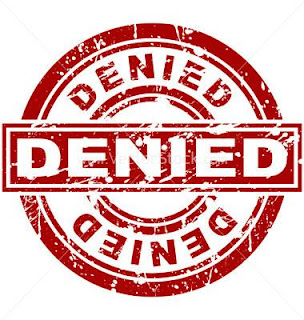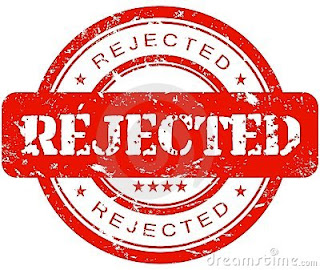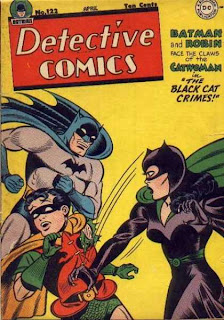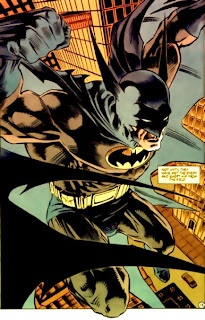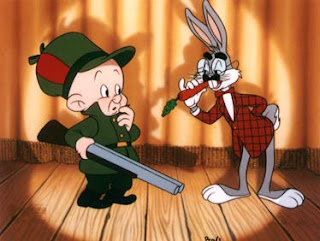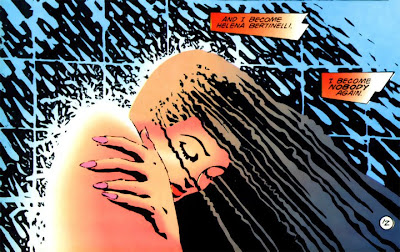 |
A striking panel from Netzer's
1994 Huntress mini-series. |
This entry we interview Mike Netzer, standard bearer for creator's rights and the campaign to rescue comics from oblivion.
Let’s start with the basics, Mike. Where and when were you born, and where did you grow up?
Born in Detroit, Michigan, 1955. Moved to Lebanon in the Middle East at age of about 1 year and raised there until age 11. After that, back to Detroit until I moved to NY and started drawing comics at age 19.
How did you get interested in art and comics?
I don't really know where that began. Like most children I started drawing early, but at about age 3 my mother brought me a few comics and they seemed to grab all my attention, especially an early Batman. Something about that Bob Kane square-jawed man in a bat costume had a strong allure for me and I started drawing every image of the character in the comics I had. By the time I was in first grade, the drawing skills were developing notably for that age. I'm honestly not sure I would have stuck with drawing were it not for the comics.
When did your drawing begin to take the form of continuity storytelling? Was that right at the beginning with the Bob Kane Batman?
No, it happened much later, around the first year in college when I began thinking about having storytelling samples for the eventuality of trying to get work as a comics artist. Drawing from Bob Kane's Batman drove me to discover drawing, but I didn't have enough comics at that age for a lasting inspiration. So, I'd also draw from photos in magazines and books, mostly a set of Encyclopedia Britannica. I especially liked copying photos of fine art, paintings and statues and such. When I came back to America at age 11, that attention shifted to the enormous amount of comics now at my disposal. But it was mostly working with singular images until a time drew near that I anticipated I'd make an effort to draw comics. I produced a couple of short story samples in college and that was basically the only sequential storytelling work I'd attempted before starting to work in the medium a year later.
Did you have any formal art training?
I was very immersed in the art curriculum in high school, which was quite professionally intensive due to a couple of excellent teachers there. My two years in college were more like a rigorous program at an art institute. Wayne State University in Detroit was located near a major arts and crafts academy and competed with them. Instead of following an academic path at WSU, I'd decided I wasn't interested in a degree but rather in the actual art studies. So I filled my curriculum with advanced art studies across the range of design, painting, life drawing, art history and English literature. A couple of years within such a framework allowed me to finish masters courses in these subjects, with pretty good grades, but no degree. I thought I'd get more from the experience this way and in looking back I can't say I regret it at all. It helped me where I really needed it for the professional work that followed.
Give us an overview of your time working in American mainstream comics.
I think like most things in life, the stronger the good we experience in anything we do, then the bad will also be stronger. I've had a few cycles of working in mainstream comics and they've all been very intensely charged. Maybe the most charged of anything else I've done. There is a natural thrill for me in drawing comics and particularly superheroes. It's been such an intensive discipline that it pretty much consumes me while I'm doing it. And that apparently comes with a price. Notably, sort of neglecting most everything else in life. Not necessarily being oblivious to it but rather absorbing and dealing with everything else as if it's on a back burner, so to speak,
But there's also the added value of the outreach to and from the readers that adds an element of trying to keep me connected to the rest of the world somehow. My nature is sometimes quite extreme in that I thirst for a totality in most everything I'm engaged in. While working in comics, that's translated to a somewhat colorful journey in and out of the medium, several times already. 35 years later, it doesn't look like that intensity is letting up at all. Rather growing actually.
Can you also tell us, briefly, which companies you worked for, and which characters you worked on? I believe you had an association with Neal Adams and Continuity, perhaps you could touch on that.
There weren't that many comics publishers back in the mid-70's. The bulk of my work was for DC Comics. But I always did a job here and there for Marvel as well. There was Western and Charlton that I did a lone job or two for and the rest was more in the advertising area, mainly for Continuity Studios, where I was based. Working with Neal Adams was the pivoting point around which everything revolved for those first few years. The studio environment and everything about it being the hub of the comics community, pretty much shaped not only the career development, but also the community spirit or common ideology of the world of comics creators at that time. It was a vibrant and near magical time where most everyone working in comics had to be in NY and pretty much knew and socialized with everyone else in the business. Being such a tight community also meant that we spent our leisure time together just as much as the work time we shared.
Enumerate the pros and cons of your tenure in mainstream comics. What was positive and what was negative about the experience?
10 or 15 years ago I would likely have answered that differently, such as focusing more on the actual comics I've worked on and the craft of drawing. But today, in retrospect, I'd say the most positive thing has been the push that I've inadvertently become known for outside of the mainstream comics, namely searching for and trying to advance an integration of the medium into the bigger picture of our world, history and aspirations as a civilization. This somewhat well known aspect of my career pretty much overshadows the actual comics work I've done. So much so that it reveals a sort of failing as a career artist. Which is likely the closest thing to a negative side to this picture. I'm pretty certain that my actual career as an artist would have been much more developed had I kept up the momentum of the first couple of years of drawing comics. But I've become seasoned enough through the years to understand the ups and downs of life a little better and to look at the negative aspects of it as a necessary component for enhancing or magnifying the good. In that sense, I'm mostly resolved to a space where I don't really believe there can ultimately be any real mistakes or shortcomings in our human experience. There's something about the nature of most people that drives us to strive for the better, even at the peak of the most difficult falls. When our lives are seen as an integral homogeny that cannot be ultimately compromised by an artificial desire for a more perfect existence, then it seems easier to perceive a sort of perfection in our every-day state, each step along the way.
What are your major issues with the comics industry as it is today?
Well, first and foremost, as Mike Dubisch said in response to Steven Niles' first article on supporting creator owned properties, comics have to get huge and right now. It was actually his passion on this that drew me into the present round of what's been dubbed as the creator revolution. It is quite unfathomable to look at the comics industry today and to believe that an entire cultural artifact has been committing virtual suicide for more than 30 years now. There is no other business or medium in the world, at least of this magnitude, that's been managed and driven as irresponsibly and negligibly as the comics industry. Most every business decision taken by industry leaders since the late 1970's has been more like a nail in the coffin of a slowly dying comics medium, trying to snuff out the life of a once thriving industry.
From the content of most mainstream titles catering to an ever shrinking base of readers, to the bizarre Direct Market infrastructure that guarantees comics sales will continue to decline... just about everything, and I mean everything, about the business of publishing comics looks more like a doomsday curse, rather than a sound business strategy backed by the most powerful media conglomerates in the world such as Warner’s and Disney. The overhaul that the industry needs right now touches on most every aspect of the comics culture. This is not to take away from some of the fabulous and incredibly prolific comics being produced across the entire gamut of mainstream and Indie publications. It's actually expected that in this dire time for the business, the creative adrenalin will flow stronger amongst the creators. But the comics are more than an art form. They're also a business that operates within larger economic wheels, and must be driven by the same love for the medium that the creators and fans have. This passion, drive and wisdom in managing a business are exactly the ingredients missing from the major publishers, and are keeping comics market down today. This is the part of the industry that needs the greatest overhaul.
There are a lot of excuses being given for the state of affairs ranging from the shift to web-culture all the way to a naïve acceptance of market forces and buyer choices actually being behind the decline. And they might be more acceptable if we didn't have this blatant variable of negligent irresponsibility on the part of leading publishers. All this indicates in the end is that the comics industry will become much healthier when a sincere effort is made by the corporate entities towards healing it. None of these excuses warrant the self-destructive behavior we're seeing today. Just the opposite, if the general business environment is having a difficult time, then that's all the reason for an extra concerted effort to make up for it with more sound and creative policies.
What changes do you think should be made to improve the industry?
First of all we have to remember that we're not talking about Dan Didio or Alex Alonzo being behind the mess we're in. We're talking about Warner Bros. and The Disney Company who are two of the most powerful media conglomerates in the world. To accept the excuse that solutions for improving the state of comics publishing are beyond their control is simply naïve and ludicrous. It seems to me that a freshman economist could look at this picture and immediately devise a basic plan for improving things.
Steps must be taken to dismantle the bizarre Direct Market distribution and return to spreading comics all over the country again the way they were before the DM took over. Comics stores will remain the main outlet for a comprehensive buyer demand. Making some comics available and visible everywhere consumers shop will increase the overall buying market and reflect itself in the LCS audience. This will open a door again for other distributors to compete and not a moment too soon. This is the first and foremost bottleneck problem that comics sales face.
DC and Marvel don't have to add more non-superhero comics to their line if they don't want to. Thank God there are enough such publications from smaller publishers and Indies to fill at least half of the expanding shelf space in a growing number of stores, when the buying market and comics sales begin to grow. We really don't have much of a problem with content, we only need to give smaller publishers a little room to breathe and an opportunity for their products to be seen by a public that begins to embrace the art form, as it's embraced in Europe and the Far East.
Comics creators, and I think this includes everyone, must put aside the genre-competitive attitude and realize that we are all in this boat together and need to present a unified front in order to have a voice and leverage for better working conditions and a greater share of intellectual property rights on everything we produce. This isn't only about creator owned projects. It applies to every comic book that's being published regardless of who created it. The reason for this is that current comic books are being used as a base and inspiration for outside ventures from film, television, games and toys to countless consumer products on the market. Every bit of work contributing to these profits, including a run on an established series, gives the creators who contributed to it a right to profit sharing from any outside venture their work influences. We have to pull our heads out of the sand and begin articulating our basic rights in a way that brings a little more fairness back to the creator/publisher relationship. This is a necessary ingredient not only for the creators but also for publishers and corporate owners. It's what's needed for a contemporary renaissance of the art form and it will ultimately benefit everyone all the way to the top. Trickle-up economics, if you will.
I think we can go on for a while and get into a lot more detail but these issues outlined above perhaps cover the most important issues needing to be addressed right now. I'm sure a lot more specific and creative ideas will burst from the comics community when we begin seeing a move in these directions.
Tell us about the petition.
Let me first give a little background on what drove me to write that petition. When I joined the recent discussions on the creator revolution, I noticed a strange thing happening there. It's perhaps best condensed in the difference between Eric Powell and Steven Niles' approaches. Eric slammed head on into the DC and Marvel dominance of the LCS, while Steven was saying “we can basically dodge them and advance creator owned projects through other venues”. I could understand if these two sides of a healthy debate were contending side by side on the issues, but the strange thing was that most Indie voices chiming in were on the dodging side only. The same was true for most industry news sites covering the debate, perhaps with the exception of Tom Spurgeon's Comics reporter. To me this seemed like another nail being driven into the coffin of the comics business. There is no way to ultimately dodge DC and Marvel's dominance of the comics market. It must be addressed forthrightly in order to have some hope for growth of the industry. And it seemed to me that this was a very divisive stance. Indie creators are so disgruntled with the big 2 that they've come to see them as beneath their contempt to even acknowledge their existence and the problem they pose. In that most industry news sites were also taking this strange position, it seemed to me that the only way around the issue, when a healthy debate is being suppressed in this way, is to take the case directly to the people. In this case, comics fandom.
With this in mind, I wrote the petition in order to be able to say things that most creators and journalists don't seem to be willing to say openly, even though they might really want to. The petition is perhaps the first direct statement made publicly at this level in order to help us place all our cards on the table and understand what we're really up against. The interesting thing about it is that most of the comments left there are basically calling for more fairness towards the Indie market by the major players dominating comics publishing. This is the result of a petition which has the name of DC and Marvel in its title. And though I hadn't anticipated it, I couldn’t have thought of a better way to bring the two sides together if I'd tried.
As the number of signatories on the petition grows, we need to look ahead towards the ramifications it might hold down the line. Public pressure has always been one of the most powerful tools for influencing corporate policy towards a little more consideration for the welfare of their socio-economic environment. The goal of the petition is to raise a public outcry over the situation. And, to eventually burst through its present cocoon and spread into the mainstream media. This is not such a farfetched idea at all. Movements like this are known to snowball and grow exponentially once they break a certain threshold.
The petition is very carefully worded in order not to make unverifiable accusations. I suggest everyone read it and take a look at the signatories and comments they're leaving behind in order to gauge the pulse of what comics creators, professionals and fandom are saying. In the end it is quite harmless, regardless of natural trepidations some have about signing petitions. The hope it has for setting needed wheels into motion is very tangible, so I ask everyone to pitch in and sign on if they're inclined.
You have also filed a complaint with the Federal Trade Commission. (As a Canadian, I’m not too familiar with the agency.) Do you feel this is a viable complaint, or is it more of a symbolic method of bringing attention to the problems of the comics industry?
Perhaps both at once. The complaint was lodged through the FTC web site. Anyone can lodge any complaint they like through it. The body of the complaint is basically the petition. I understand this is not a legal document and doesn’t rely on a specific abuse of the laws of fair trade. But I do understand the FTC made this option available on their site just for this type of situation. So the common people could have access to state a grievance. Considering the situation that DC and Marvel dominate a market they don't seem to have a vested interest in, because their profits come from outside of comics, and because their negligence of it is injurious to the entire industry, then I believe there is a basis in the complaint for further investigation. The FTC is, after all, about insuring fairness in competitive business practices.
On the other hand, lodging the complaint gave the petition a little well needed push that brought the industry's attention to it. I think in that sense it served both purposes well so far. But I expect we'll soon find out what the response from the FTC is and can move ahead with the complaint as needed when the time comes.
You suggest that Marvel and DC, and the big entertainment entities behind them, need to give smaller companies breathing room. Isn't that anathema to current corporate thinking? While I understand the ways in which this would make the industry healthier overall, I don't see many big corporations doing anything other than crushing, smothering and destroying all competition.
This is sadly the picture and I understand that it seems like quite the formidable type of power to hope for any change in the thinking there. But things weren't always that way in big business. Back in the 50's and 60's, as an example, business policy was more oriented towards nurturing an overall market for everyone with a little more collective goodwill applied to general policies. This was the general spirit promoted in the high-school economics classes of the early 70's that I studied. By the late 70's things started changing and I remember what big news the Time-Warner’s merger was back then because it signaled a beginning of a deluge of such corporate acquisitions that began shifting the emphasis from collective responsibility to an "everyone-for-themselves-at-everyone's-expense" type of attitude.
But I believe that when understanding the root as being a prevailing attitude that overcame the general goodwill within which business was being conducted, and not something necessarily etched in a stone heart of human psyche, then it's easier to see that trying to change things back towards collective responsibility is basically inherent in influencing the human nature of policy makers. Which is not so far out of reach as it seems when looking at the strength of corporate giants. People remain people and we are all ultimately products of our environment. If we can change the environment at the lowest popular level, then we have a much better chance of changing the attitude of policy makers all the way at the top.
That's why this campaign starts with a petition that's very carefully worded to elicit a response to this basic issue of the attitude in which the comics business is being conducted...which is also the prevailing business attitude all around. Things being as they are, the greatest hope for change can only come when the buying public rejects the notion that things can continue this way and says so loudly and clearly. It seems to me that in our time today, more than ever, people are generally beginning to see the self-destructive nature of corporate business policy and the hopeless path that it's leading everyone on. While the lucky and strong few at the top of the pyramid will remain content with things as they are, their number continues to decrease while the segment of struggling populace increases.
This tells me that it's as fertile a time as any to call on the perception and goodwill of the common people in order to raise a clear and unmistakable voice in rejecting the path we're all heading in. The road is long and hard but all indications so far show that we are moving in the right direction with the petition and campaign. There was very little hope a couple of decades ago that it would get the general support its gotten today. But this is really only a beginning of a much wider and far-reaching movement that aims to spread like a mushroom cloud covering everything around it. And it has much more to do with human nature than with a technical view of business strategy or a mechanical approach to social government. It is all about raising the voice of the people into its rightful place as primary influence over the world that we want for ourselves and for our children. It overcomes all types of oppression exercised on society under the umbrella of democracy and free economy.
It is the biggest hope we have for changing the seemingly hopeless tides taking the world down a path of near slavery of mind, body and soul, that the powerful few are leading us into.
Your suggestion to give creators a bigger piece of the pie from sales and licensing also seems to go against the grain of typical corporate operating procedure. What's to stop companies from outsourcing the work to countries where the work it be done more cheaply and without giving up any of the marketing profits?
Well, paradoxically, I'm counting on this greedy nature of corporate policy and looking to leverage it to our advantage. When the general attitude of the buying market begins to react adversely to such short-term policies that produce inferior products, then corporate strategy will begin exploring the options that the people are suggesting. It becomes a growing movement that overcomes the forced perception of economic feasibility they're trying to shove down our throats.
Let's look, as an example, at the environmental issues that were first being voiced in the late 1960's. Back then, this movement was considered rather hopeless and had to contend with environmental abuse by formidable industry giants that the general economic welfare depended upon. The movement grew in time during the 1970s by working diligently in informing the public through sympathetic media and communications outlets. By the 1980's, we began hearing about global warming and everyone was scurrying to either prove or disprove its veracity. It became a public issue that began to take hold in business decisions all the way at the top of the pyramid. And while we still have a public controversy over it, the hold that this issue has taken in the business world is quite phenomenal when considering the extra burden it puts on the economy. So the question is what benefit does the business world gain from supporting energy efficient platforms? The answer is simple, public perception has changed to the point that a large enough segment of the buying market understands the need to support them. This has basically twisted the arm of a once belligerent business world and we can see the largest conglomerates standing behind what they once fought against tooth and nail.

I think that since that the pace of social evolution is increasing exponentially in time, that we really don't need a few decades to achieve a similar thing in the comic book industry for the near future. We've been supporting creator owned projects since the mid-70's though it seems like a more recent development. The undercurrents of the industry are full of a public outcry for a more attentive approach to a higher quality comics narrative. We only need to encourage these voices so they rise to the surface of public debate. We need to work diligently in order to turn this subject of the soul of the comics medium into the most talked about issue on the front lines of the industry. We have an amazing array of tools that the environmental movement didn't have at its disposal decades ago and we need to use these tools to the advantage of the future of the medium.
There is a great imbalance in this area seen at major comics news sites today. They are more obsessed with the fluffy fun of populist iconography than with fulfilling their historical role as the watchdogs of the industry. Perhaps the only major players lending ear to the issues are Tom Spurgeon and Rik Offenberger. Other major reporters such as Heidi MacDonald and Rich Johnston appear to be ignoring it altogether for the sake of a superficial "lets-weed-out-the-negativity-and-just-have fun" type of reporting. When faced with such a blatant imbalance in comics journalism, we find ourselves with no choice but to ignore the major players altogether and take the case directly to the people in the forums and blogs where the core of fandom traditionally gathers.
But just as it was for the environmental movement in its early stages, major news sites eventually took the gauntlet and ran with it when it became a strong enough public concern, due to the grass-roots promotional efforts of the movement. I think we can expect to begin seeing a shift to more coverage of these sensitive issues by major comics news sites within the next year ahead, because I can see much more talk about it in the public arena of comics fandom today.
This is really what grass-roots is all about. We're only at the beginning.
Thanks, Mike, for your time, energy and love of the medium.
Find out more about Mike by reading this revealing interview by Rik Offenberger at Comics Bulletin:
And by checking out Mike's own web site:
Things have been a bit comic-centric on the blogs of late, so this will be the last entry on comics shared by both blogs. FIGHTING WORDS will be moving on to other topics.
However, I'm going to continue talking about comics for a few more entries on my companion blog, MOVING PICTURES, for those who might be interested in some interviews with a few terrific web-comic creators and some personal thoughts on the writing of Scott McCloud.








